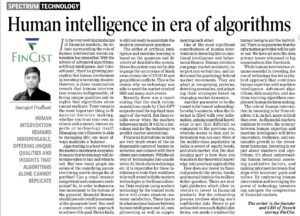
In the ever-evolving landscape of financial markets, the debate surrounding the role of human intervention versus automation has intensified. With the advent of advanced algorithms, artificial intelligence, and ‘robo-advisors’, there’s a growing perception that human involvement in investing is becoming obsolete. However, a closer examination reveals that human intervention remains indispensable, offering unique qualities and insights that algorithms alone cannot replicate.
Trust remains the most important thing in financial decision making, whether you trust your own instincts and acumen, human experts or technology itself. Managing one’s finances is akin to managing life; one must always maintain a ‘balance’.
Algo-trading is a buzz word in the modern investment ecosystem. It means that technology will determine when to buy and when to sell. But how many people are aware of the underlying parameters being used to design the algorithm? Can a retail investor comprehend such unknown mechanism?
So, in order to democratise investment to the bottom of the pyramid, financial literacy should precede retail investment at the grassroot level. You need a community centric approach to achieve this goal. Hence India is still not ready to assimilate the modern investment practices.
The edifice of artificial intelligence and machine learning is based on the quantum and diversity of data fed to the system. Hence the system may not be able to gauge the occurrence of black swan events like the COVID-19, geopolitical conflicts, etc. Hence no technology was able to avoid the market crash of 2020 and many such events.
Recently, there was a report stating that the stock recommendations made by Chat-GPT outperformed the top fund managers of the world. But these results occur when the markets behave normally. It will be a herculean task for the technology to predict the market aberrations.
Financial Institutions in India are very much aware of the fact that indispensable nature of human interaction and connect with their clients and customers. With the advent of technologies like quantitative AI, block chain technology, etc. it is imperative for these institutions to train their workforce to be well versed with the modern technologies in the financial sector.
Data analysis using modern technology by the trained workforce will create absolute customer satisfaction. There has to be a harmonious balance between human intelligence and artificial intelligence, complimenting as well as supplementing each other.
One of the most significant contributions of human intervention to investing lies in emotional intelligence and behavioral finance. Human investors can gauge market sentiment, interpret non-verbal cues, and understand the psychology behind market movements. They are adept at recognizing patterns, detecting anomalies, and adapting their strategies based on changing market dynamics.
Another parameter to be discussed is the ‘ease of onboarding’. In today’s scenario, when the internet is filled with over information, gaining superficial knowledge is not that difficult as compared to the previous era, wherein access to data and information was not easy. Most of the middle-class population in India is aware of equity, bonds, stock market, etc. But, the challenging part is how does one transform the theoretical knowledge into practical applicability.
How does one invest in financial products like stocks, bonds, mutual funds, etc. is the million-dollar question. There are multiple platforms which allow investors to invest in financial products. But the onboarding process involves sharing one’s confidential data. Hence to get onboarded onto such digital platforms, one needs a trustworthy human being to aid the individual. There is no guarantee that the information provided will be safe or not. We have all seen the data privacy issues witnessed in big organizations like Facebook.
While human intervention remains essential in investing, the rise of technology has led to a hybrid approach that combines human expertise with machine intelligence. Advanced algorithms, data analytics, and machine learning algorithms complement human decision-making, offering powerful tools for analysis, risk management, and portfolio optimization.
In conclusion, the role of human intervention in investing is far from obsolete; it is, in fact, more critical than ever. While algorithms and automation have their merits, they cannot replace the intuition, judgment, and adaptability of human investors. As financial markets continue to evolve, the synergy between human expertise and machine intelligence will drive innovation, resilience, and sustainable growth in the investment landscape.
Investing is not just about numbers and algorithms; it’s about understanding human behavior, assessing qualitative factors, and making informed decisions that align with investors’ goals and values. By embracing human intervention and leveraging the power of technology, investors can navigate the complexities of financial markets.
